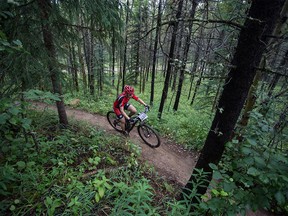Critics of logging in the zones say its economic benefits are fleeting compared to those from the long-term protection of the area in terms of local and tourism use

Article content
Impending clear-cutting of treasured hiking and biking areas near Bragg Creek will be done responsibly, Alberta’s minister of environment and protected areas said Tuesday.
But conservationists and outdoor enthusiasts say they have their doubts, and insist logging two large blocks in the West Bragg Creek and Moose Mountain areas is also economically dubious.
Advertisement 2
Article content
Article content
Forestry company West Fraser said it’s going ahead in the fall of 2026 with logging what could be nearly 900 hectares of forest in a recreation zone laced with hiking, mountain bike and ski trails less than an hour from Calgary.
They have provincial government sanction to do so under a 20-year forestry management plan, but only under sustainable conditions, said Environment and Protected Areas Minister Rebecca Schulz.
“My department is concerned with ensuring we are protecting the environment, that environment standards are upheld, that we’re looking at impacts to water, wildlife, air and biodiversity — so those are the kinds of things we look at before projects move forward,” she said.
Recommended from Editorial
Critics of logging in the zones say its economic benefits are fleeting compared to those from the long-term protection of the area in terms of local and tourism use.
Schulz said the province is committed to a healthy balance of industrial activity and environmental sustainability in a way that won’t impede tourism.
Article content
Advertisement 3
Article content
“We always have to balance economic opportunity with holding up our highest environmental standards, and of course tourism and the mountains are something Albertans and the rest of the world see as one of our most precious resources,” she said.
‘Quite disturbing’: Critics warn wildfire hazard could increase
She also said forestry activity plays a role in mitigating fire risks.
But critics said the logging in the area isn’t designed to minimize the wildfire hazard and could even increase it.
“It’s quite disturbing to hear that from her,” said Shaun Peter of Bragg Creek and K-Country Outdoor Recreation, which promotes the area.
“Unless you do it in a very fire-smart way where you protect the deciduous and aspen and fireproof species . . . you’re going to have very limited, if any, fire protection.”
Local businesses that rely on some of the 365,000 outdoor enthusiast visits to the areas each year are already dreading the logging activity, he said, adding considerable public money and sweat investment is at risk.
“There’s been $6.5 million and 100,000 volunteer hours that have gone into those trail networks, and (the logging) is directly over top of those trails,” said Peter.
Advertisement 4
Article content
Open house to be held, but critics skeptical
An open house on the plan is being hosted by West Fraser at 3 p.m. on May 8 at the Cochrane RancheHouse to collect public feedback.
On Saturday, a spokeswoman for the company said while the logging will be going ahead, it’ll be subject partly to what comes out of public consultation, a sentiment echoed Tuesday by Schulz.
But Peter said past consultation provided no opportunity for feedback and another critic said that process isn’t as important as public influence on the longer-term forest management plans that oversee each logging proposal.
“There’s not enough time for the public to be involved to ensure changes are made before each forest management plan is created every 20 years,” said Devon Earl, conservation specialist with the Alberta Wilderness Association.
Cumulative impacts ‘putting a strain on ecosystems’: conservation specialist
Clear-cutting one or two forestry blocks might not have a devastating environmental effect, but years and decades of the activity does, she said.
“There’s an issue of cumulative effects on the Eastern Slopes, which is affecting water and climate change . . . they have not been managed properly,” she said.
Advertisement 5
Article content
“It’s the fact everything is happening everywhere all at once and it’s putting a strain on ecosystems.”
The impacts of logging, coal mining, oil and gas production and heavy recreational use are putting stress on at-risk species in the Rockies such as three types of trout, with a watercourse in West Bragg Creek a prime habitat for one of them — bull trout, said Earl.
Following public outcry, West Fraser said it was pausing plans to log in the upper Highwood area last winter, saying the delay was needed to hear more from the public.
Conservationists and other concerned groups say West Fraser’s plan to harvest the 1,100-hectare plot, or the equivalent of 2,000 football fields — including a stretch along the Highwood River — threatens the environment, wildlife habitat and recreation in the area.
X (Twitter): @BillKaufmannjrn
Article content





